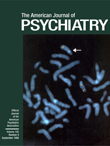The article by Zimbroff et al. evaluating the efficacy of sertindole is impressive in many respects, but it illustrates some of the same difficulties that have been described for other studies evaluating the new atypical neuroleptics
(1). Specifically, the study sheds little light on how typical neuroleptic-responsive patients with schizophrenia will respond to sertindole.
As the authors noted, their subjects were chronic and relatively refractory. Sixty-seven percent of the group had been hospitalized at least six times before the study. It is unclear how long patients had been hospitalized before study entry; the authors state that “42% (N=91) of the patients for whom data were available had been hospitalized for more than 15 days before entry,” but given a total of 497 patients, this suggests that the authors did not have data available regarding length of hospitalization for most of their patients. Perhaps they could obtain this information and present it.
The patients did not respond robustly to haloperidol (although response was significantly better than response to placebo). The mean improvement in scores on the Brief Psychiatric Rating Scale for subjects taking haloperidol was somewhat less than 10 (from a baseline mean of about 55). This is considerably less than one would expect in neuroleptic-responsive patients. The authors attempted to minimize the inclusion of treatment-resistant patients but were clearly only partially successful in this.
The authors reported overall equivalence of haloperidol and sertindole, with superiority for sertindole in treating negative symptoms. This implies that haloperidol might be slightly better for positive symptoms, and the data presented do suggest slight superiority for haloperidol on the positive symptoms subscale of the Positive and Negative Syndrome Scale (although this is not even close to statistical significance).
Drug companies would need to explore alternative study designs to evaluate the effects of the new neuroleptics in neuroleptic-responsive patients. One approach, which may or may not obtain approval of the institutional review board, would be to discontinue medication for neuroleptic-responsive patients, wait for patients to relapse, and then randomly assign them to treatment. This would probably require the drug company to pay for a period of hospitalization, and patients would probably need a financial incentive to participate. An alternative, somewhat less expensive, approach would be to identify neuroleptic-responsive patients on a regimen of standard neuroleptics and to randomly assign them to stay on the regimen, to switch to an atypical antipsychotic, or to take placebo. Patients would then have to be carefully monitored for a prolonged period of time (e.g., 6 months). This could be done primarily with outpatients, although hospitalization would be required for some patients.Until studies involving neuroleptic-responsive patients with schizophrenia are conducted, one cannot say with certainty whether the new atypical neuroleptics will be as effective as the old agents for positive symptoms in neuroleptic-responsive patients.

